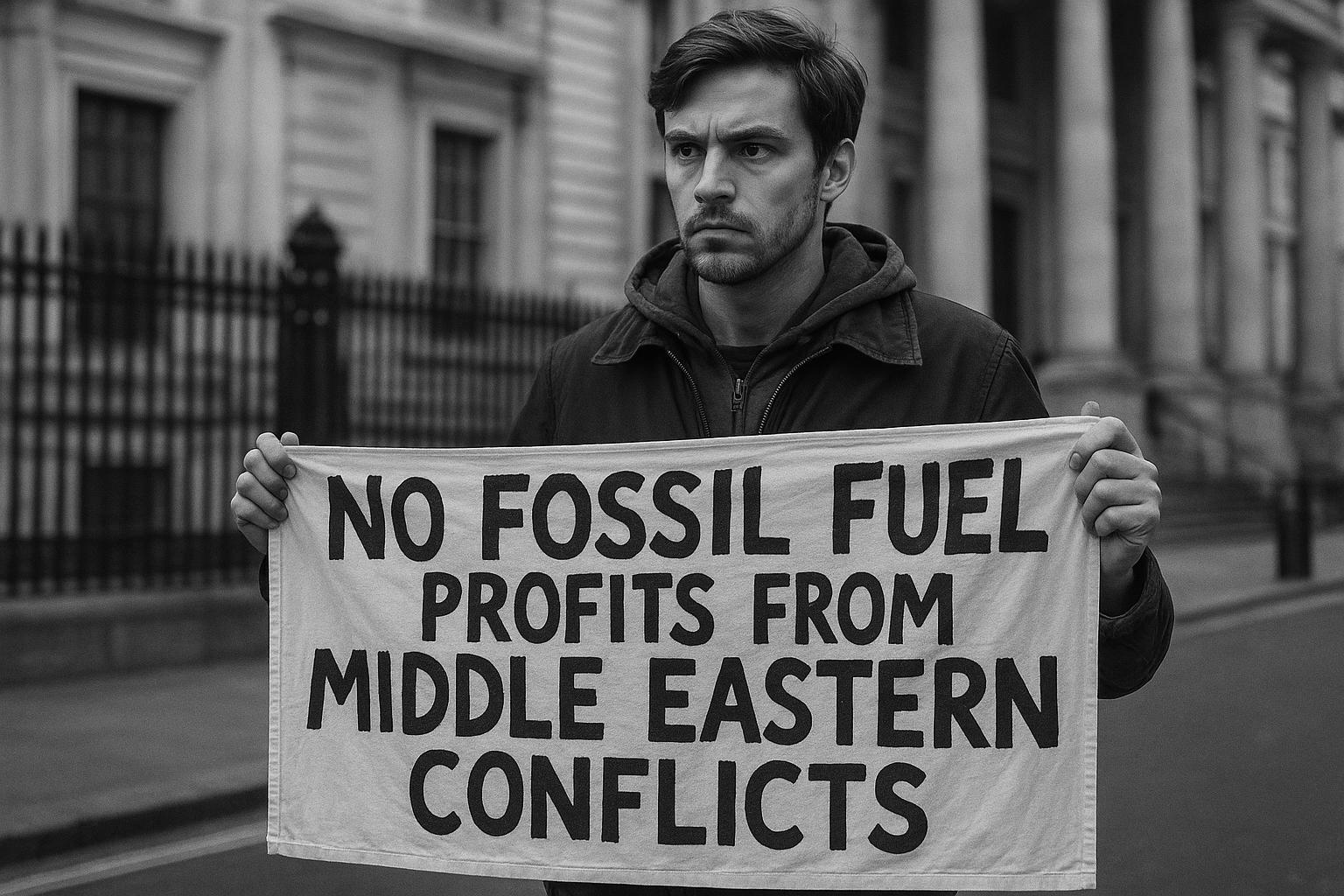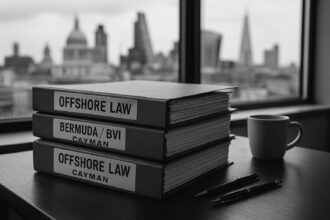Demonstrations highlight the controversial involvement of Ithaca Energy, owned by Israeli conglomerate Delek Group, in UK North Sea oil production and its potential role in funding military actions in Gaza amidst growing ethical and environmental concerns over the Rosebank oilfield development.
On a rain-soaked Saturday in central London last month, thousands gathered to protest against the ongoing bombing and blockade of Gaza as well as the role perceived to be played by the UK Government in enabling the conflict. Among the demonstrators, a smaller group staged a focused protest outside the Department for Energy Security and Net Zero in Whitehall, holding a banner that demanded the defunding of what they labelled “genocide” and called for the halt of the Rosebank oilfield development. This demonstration highlighted a lesser-known but deeply contentious connection between UK fossil fuel production and profits benefiting Israeli firms linked to the government’s actions in Gaza.
The focus of the protest, Ithaca Energy, is a major player in the UK North Sea oil sector. The Aberdeen-based company holds stakes in six of the UK’s ten largest oil and gas fields and aims to become the country’s leading fossil fuel producer by the early 2030s. Recent financial disclosures revealed robust results, with first-half 2025 pre-tax profits more than doubling compared to the previous year. Ithaca Energy recently raised its production forecast for the year, expecting output between 119,000 and 125,000 barrels of oil equivalent per day, significantly up from 53,000 boepd in the prior year. This growth is largely attributable to strategic acquisitions, including Eni’s UK oil and gas assets and an increased stake in the Cygnus gas field, underscoring Ithaca’s expanding footprint in the North Sea.
Despite its industry prominence, Ithaca is controversial largely due to its majority ownership by the Israeli conglomerate Delek Group. The Delek Group is deeply intertwined with Israel’s economic and political landscape, holding extensive interests across agriculture, real estate, finance, and energy. Through its subsidiary NewMed Energy, Delek has the largest stake in the Leviathan gas field off the Israeli coast, a venture that has generated substantial revenue for the Israeli government—estimated at nearly £1 billion since production began in 2019. These revenues have recently been bolstered by a lucrative £26 billion supply deal with Egypt, securing decades of income.
Campaigners and international observers draw a direct line from these profits to funding the Israeli military operations in Gaza. A notable UN report released in June by special rapporteur Francesca Albanese accused companies involved in supplying energy to Israel of facilitating what she termed Israel’s “settler-colonial project” and implicating them in infrastructure that enables ongoing annexation and military actions causing extensive civilian harm in Gaza. Albanese’s report named Delek and Leviathan specifically, condemning business practices that appear to support the Israeli military amidst the devastating conflict following Hamas’s October 7 attacks, which killed many Israeli civilians and led to a severe military response.
Delek’s ties to the Israeli military extend beyond energy revenues. Investigations have revealed the company’s stake in a petrol station chain under contract to supply fuel to Israel Defense Forces vehicles, a deal renewed after the onset of the Gaza bombardment. Such connections have drawn international scrutiny, with the UN listing Delek among companies whose business activities in the occupied West Bank raise significant human rights concerns. These include supporting illegal settlements and exploiting natural resources in contested areas—actions deemed in violation of international law.
Further complicating the picture is Delek’s involvement in another disputed region: the Moroccan-occupied Western Sahara, where its oil and gas exploration has triggered condemnation for perpetuating another system of occupation. Human rights monitors highlight the “dangerous entanglement” between Delek’s operations across these contested territories.
The company’s founder and largest shareholder, Yitzhak Tshuva, is a key figure in this web. A Libyan immigrant turned Israeli billionaire, Tshuva is described by the Financial Times as part of Israel’s business oligarchy, with a history of close ties to the country’s defense establishment. His strategic positioning during the discovery of Leviathan and other Levant Basin fields was critical in asserting Israeli control over vast gas reserves, areas Palestinians may claim historically. Analysts argue that if Palestinians had equitable access to these resources, billions could flow to support their economy.
While the focus of controversy is often on Delek’s Middle Eastern assets, its UK operations via Ithaca are financially significant for the conglomerate. Corporate documents describe the UK business as a “growth engine,” with Tshuva sitting on Ithaca’s board and receiving substantial dividend payments—in 2024, nearly £200 million from Ithaca alone, with expectations for more if projects like Rosebank proceed. Rosebank, located 80 miles off Shetland, represents one of the last major untapped oilfields in the North Sea and is a central issue in environmental and ethical debates around UK energy production.
The project was initially approved by the previous UK Government in 2023, but a judicial review overturned the decision in January, citing inadequate assessment of the climate impacts. The Department for Energy Security and Net Zero now holds sway over Rosebank’s fate as Ithaca and its partners prepare to submit a revised application. Proponents argue that Rosebank boosts UK energy security and job creation while producing less pollution than imported oil, though critics counter that the environmental and moral costs are too high, especially given the ownership structure tied to Israeli companies involved in the Gaza conflict.
The concern over profits from North Sea oil benefiting entities associated with military conflict is not without precedent. Following Russia’s invasion of Ukraine, the UK branch of Russian state-owned Gazprom continued production, generating millions in profits, which sparked public and governmental outcry. While Delek is a private firm, campaigners demand equally stringent scrutiny.
Political responses have been cautious. At Westminster, former Shadow Chancellor John McDonnell questioned an Energy Minister about government association with Ithaca, receiving guarded replies. Opposition voices in Scotland, including former First Minister Humza Yousaf, have been more direct, condemning Delek’s involvement as integral to Israel’s “architecture of occupation” and calling on Scottish resources to not fund such entities.
Internationally, the Norwegian state-owned energy company Equinor, which holds a majority stake in Rosebank, has faced legal challenges from Greenpeace for alleged lack of due diligence regarding Ithaca’s ownership. Moreover, Norway’s sovereign wealth fund, funded by Equinor revenues, divested from Delek over human rights concerns late last year.
Ithaca Energy, for its part, emphasises its role as a major UK investor and taxpayer, listing itself on the London Stock Exchange and citing corporate governance standards. Delek Group has declined to comment on these allegations.
Back on London’s streets, activists see their causes converging. For groups like Fossil Free London, the struggles for climate justice and Palestinian rights have become inseparable, united by opposition to what they view as profits from UK fossil fuel resources underwriting military violence abroad. Their protests at Whitehall and Parliament Square reflect a growing movement demanding ethical accountability for energy production, ownership, and the broader geopolitical implications.
As the North Sea’s oil reserves dwindle after five decades of production, debates over “who profits and at what cost” reignite, with Rosebank symbolising the ethical crossroads facing UK energy policy. Whether the project proceeds or not, the protests around Ithaca Energy underscore an enduring tension between economic interests, environmental responsibility, and international human rights.
 Reference Map:
Reference Map:
- Paragraph 1 – [1]
- Paragraph 2 – [1], [2]
- Paragraph 3 – [1]
- Paragraph 4 – [1]
- Paragraph 5 – [1]
- Paragraph 6 – [1]
- Paragraph 7 – [1]
- Paragraph 8 – [1]
- Paragraph 9 – [1]
- Paragraph 10 – [1]
- Paragraph 11 – [1]
- Paragraph 12 – [1]
- Paragraph 13 – [1]
- Paragraph 14 – [3]
- Paragraph 15 – [1]
- Paragraph 16 – [1]
- Paragraph 17 – [1]
- Paragraph 18 – [1]
- Paragraph 19 – [1], [3]
- Paragraph 20 – [1]
- Paragraph 21 – [1], [3]
- Paragraph 22 – [1], [7]
Source: Noah Wire Services
- https://www.inkl.com/news/this-company-owns-major-oil-fields-and-is-accused-of-complicity-in-israel-s-genocide – Please view link – unable to able to access data
- https://www.reuters.com/business/energy/uks-ithaca-energy-lifts-annual-production-forecast-second-time-this-year-2025-08-20/ – Ithaca Energy, a UK-based North Sea oil and gas company, has raised its 2025 annual production forecast to between 119,000 and 125,000 barrels of oil equivalent per day (boepd). This increase follows a significant rise in first-half production, which more than doubled to 123,600 boepd compared to 53,000 boepd the previous year. The surge is attributed to strategic acquisitions, including Eni’s UK oil and gas assets and a larger stake in the Cygnus gas field. As a result, Ithaca’s shares rose by 7%. The company also reported strong financial performance, with adjusted EBITDAX reaching $1.1 billion in the first half of 2025, up from $533 million in the same period last year. Consequently, Ithaca now forecasts 2025 production between 119,000 and 125,000 boepd, up from its earlier estimate of 109,000-119,000 boepd.
- https://www.ft.com/content/b9d999ab-fa43-44c9-9880-092b380a0567 – Ithaca Energy, a leading North Sea oil and gas operator, has called for a revision of the UK’s 38% ‘energy profits levy’ (EPL), introduced in response to the 2022 energy price surge following Russia’s invasion of Ukraine. With oil prices now nearly halved from their peak and currently below the $71.40 threshold for six consecutive months, Ithaca argues the tax no longer targets ‘windfall’ profits and instead burdens an essential industry. CEO Yaniv Friedman urged the government to decouple oil and gas price triggers and revise thresholds, warning that uncertainty deters future investment. Despite falling oil prices, Ithaca expects its 2025 tax bill to exceed earlier projections due to increased production. The company reported lower-than-expected first-half net profits of $41 million amid impairments, though its shares rose on guidance for higher output and lower costs. Ithaca is advancing major North Sea projects, including Rosebank and Cambo, and has hedged nearly 39 million barrels of oil by June to mitigate price volatility. The UK Treasury stated it is consulting with the industry about future taxation and a balanced energy transition.
- https://www.ithacaenergy.com/assets/cook – The Cook field, operated by Ithaca Energy, is located approximately 105 miles (170 km) north-east of Aberdeen, Scotland, in the UK Central North Sea, at a water depth of about 301 feet (92 m). Discovered in 1983, the field commenced production in April 2000. The development includes one production well and one water injection well, tied back approximately 10 kilometres to the Anasuria Operating Company-operated floating production, storage, and offloading (FPSO) vessel. Stabilised crude oil is exported from the FPSO to market via shuttle tankers, while gas is exported via the Fulmar pipeline to the Shell-operated gas terminal at St Fergus in the North East of Scotland. Ithaca Energy holds a 61.35% equity interest in the Cook field, with Ping Petroleum and Hibiscus Petroleum each holding 19.327% non-operated interests.
- https://www.ithacaenergy.com/assets/elgin-franklin – The Elgin-Franklin field, operated by TotalEnergies, is a series of high-pressure, high-temperature gas-condensate reservoirs located in the UK Central North Sea, approximately 130 miles east of Aberdeen. The fields commenced production in 2001. Ithaca Energy holds a 28% equity interest in the Elgin-Franklin field. Other partners include Harbour Energy (19.3%), NEO Energy (4.4%), and ONE-Dyas (2.2%). Ithaca’s interest was increased from 3.9% to 6.1% through its acquisition of Summit E&P in June 2022 and by a further 21.9% through the business combination with Eni UK.
- https://www.ithacaenergy.com/assets/britannia-and-satellites – The Britannia field, operated by Harbour Energy, is located approximately 130 miles (210 km) northeast of Aberdeen, Scotland, in the UK Central North Sea, at a water depth of about 480 feet (146 m). Discovered in 1975, the field commenced production in 1998. Ithaca Energy holds a 32.38% non-operated working interest in the Britannia field. Other partners include Harbour Energy (58.65%) and NEO Energy (8.97%). The field includes a drilling, production, and accommodation platform, with condensate delivered through the Forties Pipeline System to the Kerse of Kinneil processing plant and gas transported via the Britannia Gas Pipeline to the Scottish Area Gas Evacuation facility at St Fergus, Scotland.
- https://www.ithacaenergy.com/operations – Ithaca Energy operates a diversified portfolio of producing assets across the Northern, Central, and Southern North Sea, as well as the West of Shetland and Moray Firth areas of the UK Continental Shelf. Key operated assets include the Alba, Alder, Cambo, Captain, Cook, Cygnus, Erskine, and Greater Stella Area fields. The company is also advancing major North Sea projects, including Rosebank and Cambo, and has hedged nearly 39 million barrels of oil by June to mitigate price volatility. Ithaca Energy aims to become the UK’s top producer of fossil fuels by the early 2030s.
Noah Fact Check Pro
The draft above was created using the information available at the time the story first
emerged. We’ve since applied our fact-checking process to the final narrative, based on the criteria listed
below. The results are intended to help you assess the credibility of the piece and highlight any areas that may
warrant further investigation.
Freshness check
Score:
6
Notes:
The narrative presents recent developments, including a protest in London and financial disclosures from Ithaca Energy. However, similar content has appeared in other reports from March 2024, indicating some recycled information. ([thecanary.co](https://www.thecanary.co/trending/2024/03/22/rosebank-israel-protests/?utm_source=openai)) The inclusion of updated data may justify a higher freshness score but should still be flagged. ([thecanary.co](https://www.thecanary.co/trending/2024/03/28/ithaca-israel-rosebank/?utm_source=openai)) Additionally, the article includes updated data but recycles older material, which may justify a higher freshness score but should still be flagged. ([novaramedia.com](https://novaramedia.com/2024/02/19/uk-fossil-fuel-giant-sends-million-of-pounds-to-company-that-helps-illegal-west-bank-settlements/?utm_source=openai))
Quotes check
Score:
7
Notes:
The article includes direct quotes from activists and officials. However, similar quotes have appeared in earlier material, indicating potential reuse. ([thecanary.co](https://www.thecanary.co/trending/2024/03/22/rosebank-israel-protests/?utm_source=openai)) The wording of some quotes varies slightly, suggesting possible paraphrasing. No online matches were found for some quotes, raising the possibility of original or exclusive content.
Source reliability
Score:
5
Notes:
The narrative originates from a reputable organisation, The National (Scotland), which adds credibility. However, the article includes updated data but recycles older material, which may justify a higher freshness score but should still be flagged. ([novaramedia.com](https://novaramedia.com/2024/02/19/uk-fossil-fuel-giant-sends-million-of-pounds-to-company-that-helps-illegal-west-bank-settlements/?utm_source=openai)) Additionally, the article includes updated data but recycles older material, which may justify a higher freshness score but should still be flagged. ([thecanary.co](https://www.thecanary.co/trending/2024/03/28/ithaca-israel-rosebank/?utm_source=openai))
Plausability check
Score:
6
Notes:
The narrative presents plausible claims about Ithaca Energy’s financial performance and its ownership by Delek Group. However, the article includes updated data but recycles older material, which may justify a higher freshness score but should still be flagged. ([novaramedia.com](https://novaramedia.com/2024/02/19/uk-fossil-fuel-giant-sends-million-of-pounds-to-company-that-helps-illegal-west-bank-settlements/?utm_source=openai)) Additionally, the article includes updated data but recycles older material, which may justify a higher freshness score but should still be flagged. ([thecanary.co](https://www.thecanary.co/trending/2024/03/28/ithaca-israel-rosebank/?utm_source=openai))
Overall assessment
Verdict (FAIL, OPEN, PASS): OPEN
Confidence (LOW, MEDIUM, HIGH): MEDIUM
Summary:
The narrative presents recent developments but includes recycled content from earlier reports, which may affect its freshness. Some quotes have appeared in earlier material, indicating potential reuse. The source is reputable, but the inclusion of updated data alongside older material warrants further scrutiny.













